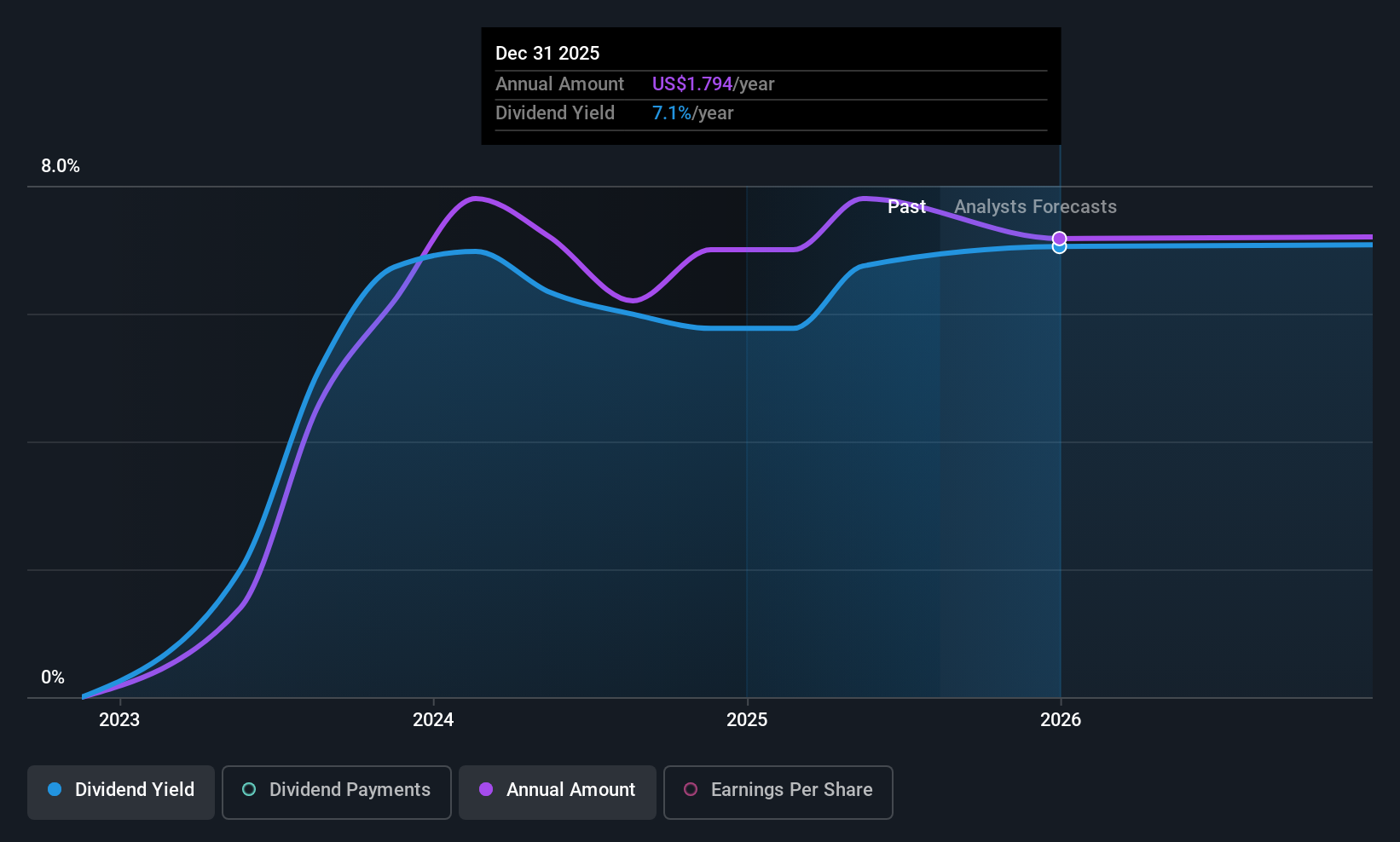
It looks like Karat Packaging Inc. (NASDAQ:KRT) is about to go ex-dividend in the next four days. The ex-dividend date is usually set to be one business day before the record date, which is the cut-off date on which you must be present on the company's books as a shareholder in order to receive the dividend. It is important to be aware of the ex-dividend date because any trade on the stock needs to have been settled on or before the record date. Thus, you can purchase Karat Packaging's shares before the 20th of August in order to receive the dividend, which the company will pay on the 27th of August.
The company's next dividend payment will be US$0.45 per share. Last year, in total, the company distributed US$1.95 to shareholders. Calculating the last year's worth of payments shows that Karat Packaging has a trailing yield of 7.1% on the current share price of US$25.44. Dividends are a major contributor to investment returns for long term holders, but only if the dividend continues to be paid. That's why we should always check whether the dividend payments appear sustainable, and if the company is growing.
If a company pays out more in dividends than it earned, then the dividend might become unsustainable - hardly an ideal situation. Last year, Karat Packaging paid out 103% of its income as dividends, which is above a level that we're comfortable with, especially if the company needs to reinvest in its business. A useful secondary check can be to evaluate whether Karat Packaging generated enough free cash flow to afford its dividend. Over the last year, it paid out more than three-quarters (78%) of its free cash flow generated, which is fairly high and may be starting to limit reinvestment in the business.
It's disappointing to see that the dividend was not covered by profits, but cash is more important from a dividend sustainability perspective, and Karat Packaging fortunately did generate enough cash to fund its dividend. If executives were to continue paying more in dividends than the company reported in profits, we'd view this as a warning sign. Very few companies are able to sustainably pay dividends larger than their reported earnings.
See our latest analysis for Karat Packaging
Click here to see the company's payout ratio, plus analyst estimates of its future dividends.

Have Earnings And Dividends Been Growing?
Companies with consistently growing earnings per share generally make the best dividend stocks, as they usually find it easier to grow dividends per share. If earnings fall far enough, the company could be forced to cut its dividend. That's why it's comforting to see Karat Packaging's earnings have been skyrocketing, up 70% per annum for the past five years.
Another key way to measure a company's dividend prospects is by measuring its historical rate of dividend growth. Karat Packaging has delivered 127% dividend growth per year on average over the past two years. It's exciting to see that both earnings and dividends per share have grown rapidly over the past few years.
Final Takeaway
Is Karat Packaging worth buying for its dividend? Growing earnings per share and a normal cashflow payout ratio is an ok combination, but we're concerned that the company is paying out such a high percentage of its income as dividends. In summary, while it has some positive characteristics, we're not inclined to race out and buy Karat Packaging today.
If you're not too concerned about Karat Packaging's ability to pay dividends, you should still be mindful of some of the other risks that this business faces. Case in point: We've spotted 2 warning signs for Karat Packaging you should be aware of.
A common investing mistake is buying the first interesting stock you see. Here you can find a full list of high-yield dividend stocks.
Have feedback on this article? Concerned about the content? Get in touch with us directly. Alternatively, email editorial-team (at) simplywallst.com.
This article by Simply Wall St is general in nature. We provide commentary based on historical data and analyst forecasts only using an unbiased methodology and our articles are not intended to be financial advice. It does not constitute a recommendation to buy or sell any stock, and does not take account of your objectives, or your financial situation. We aim to bring you long-term focused analysis driven by fundamental data. Note that our analysis may not factor in the latest price-sensitive company announcements or qualitative material. Simply Wall St has no position in any stocks mentioned.